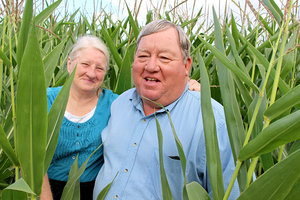NELIGH, NEB.—The cornfields of Nebraska sweep over gentle hills, disappearing at the horizon. To the modern farmer they are mathematical creations: the calculus of total acres, fertilizer per acre, inches of rainfall, tons of herbicide, radius of the giant pivot irrigator, and square feet of crops lost at the edges. Rows are planted with computer-driven precision; corn is sold when the financial analytics say the price is right.
On Art and Helen Tanderup’s small farm, the land is something else. Oh, they have some of the trappings of the super-sized operations that have become the economic imperative of farming in the Midwest. They have a pivot irrigator, an old combine, a tractor, a pickup truck. They watch the rain, and carefully figure inputs and outputs to the corn and soybeans on their 160 acres.
But the soil is also rich with history. Tradition. Memories. Helen grew up here, in the two-story farmhouse that she and her husband got when her mother passed away. She looks at the fields and sees her grandparents.
That is why the land is precious to the Tanderups. That is why they took a stand.
“I don’t want something like this to happen to what my grandparents built up,” says Helen.
The “this” is the Keystone XL Pipeline. TransCanada Corp wants to ship thick bitumen oil from its tar sands in Alberta, British Columbia, to Houston on the Gulf of Mexico, cutting through six US states and the Tanderups’ small farm.
The fight over this pipeline is one of those national issues that never seem to go away. It started nine years ago. After much hedging and delays, President Obama finally rejected the pipeline in November 2015, saying it would worsen climate change. President Trump promptly reversed that on his fourth day in office, ordering the Army Corps of Engineers to give the federal go-ahead.
Nebraska is just about the last bureaucratic hurdle before giant excavators begin to slice open the ground to insert 1,179-miles of 36-inch pipe four feet underground. An outnumbered but stubborn group of farmers, ranchers, Native Americans, and environmentalists staged a furious last-stand defense of their pipeline opposition this month in Lincoln, where the Nebraska Public Service Commission held hearings.
The Tanderups took the week off – “our vacation,” Helen says wryly – to sit in the four-day marathon at the Cornhusker Hotel. The commission is to decide by Nov. 23.
The Tanderups are a round and cheerful couple, who laugh easily and are patient with a stranger’s questions. Like so many in farm country, they left the rural countryside for careers. Art taught library science in a high school north of Omaha for 35 years; Helen worked in the student services of a college near the city. They raised two kids. When Helen’s parents got old, the Tanderups kept up the farm. Twice a week, Art would race after school the 100 miles to get to Neligh, hop on a combine to work into the dark, and rise at 4 a.m. the next day to get back to his classes on time. Summers and weekends were on the farm.
When they finally could retire – both are in their 60s – they moved to Neligh, intent on supplementing their pensions with what they could grow. “Just two old folks who wanted to retire to travel a little and farm,” Art says.
That dream did not last long.
“We moved up here, and first thing, we got a knock on the door,” says Art. It was a representative of TransCanada, who wanted the Tanderups’ signature on an easement to bury the oil pipeline through their cornfield.
“She painted this lovely picture about how it was going to help this country and all this stuff, wonderful stuff, and she left, we thought, by God we’d better go salute the flag,” says Art.
TransCanada offered them about $20,000. But the Tanderups are not hasty people. They told the agent they’d think about it, and wanted to do some research. The more they learned, the less they liked it. They did not like the United States government giving a foreign corporation the right to forcibly take a 50-foot swatch of US farmland. But the biggest danger, they concluded, was of a pipeline leak that could send toxic oil sludge into the giant Ogallala Aquifer under their cornfield.
The aquifer covers eight states, and is the lifeblood of both farming and drinking in the Great Plains. Without it, the soil dies. Farms die. Cities would grow parched. If that huge fresh pool is fouled, it could be lost forever. TransCanada says there will not be a leak. The Tanderups say they won’t stake the future of their land on that promise.
“You know, once you figure out what tar sands are, how they are mined, how they are diluted, what they are doing to the First Nations people up in Canada, what they are doing to the environment up there, what a potential leak would do here, I mean there’s no way you could be for this,” says Art. “We aren’t signing these papers.”
“Nobody likes us,” says Helen.
“Well, I mean, we started getting snubbed at church,” says Art.
That particularly hurts Helen. “All the friends that my mom and dad had here in town, and now we are standing out because we don’t feel this is right. We’ve lost them.”
But the Tanderups dug in. They started attending meetings of pipeline opponents. They offered up 80 acres to scrape a “crop art” symbol of resistance into their fields between harvests. Art went to Washington in 2014 to join thousands of protesters on the Mall. And later that year a concert by Willie Nelson and Neil Young brought 8,600 people – more than the county’s population – to the Tanderups’ isolated farm for a fundraiser to oppose the pipeline.
When Mr. Obama finally rejected the northern leg of the pipeline through Nebraska, the Tanderups thought they had won. “I mean, it was a great… it was a great day, it was a great day that day,” Art recalls, savoring the victory.
When Mr. Trump won the election, they knew the victory was gone. “We got up the next morning and we were in total disbelief. One of our neighbors came over, and we talked, we hugged, and we cried. It was not a good day.”
The Tanderups know the odds. Nebraska is Trump County, coal and oil country, and the governor has backed the pipeline. Whatever the decision of the utilities commission, the Tanderups are hoping court appeals will buy more time. And TransCanada has made some grumblings lately that there could be too few customers to go ahead with the grand project – though the Tanderups don’t believe it.
What if they lose? The Tanderups are not the kind of people comfortable with loud bravado. Both Art and Helen stare into the distance for a bit. Finally, Art says softly that he will probably stand in front of the bulldozers.
“It’s that important to us. We’ve spend a lot of time talking about it,” Art says.
“We’ve fought other things together,” Helen adds. “I’m going to fight with Art.”


